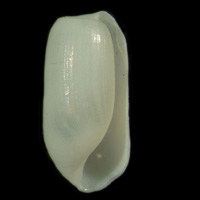|
< Previous family introduction |
|
|||||
 |
Family Retusidae Canoe shells
|
|||||
|
The Retusidae is a family of small to minute infaunal molluscs with shell length rarely exceeding 10 mm. Shells have an aperture that occupies the whole length of the shell, widening anteriorly. Retusids live in all seas, occurring on intertidal sand and mud flats and down to 5000 m. They are sometimes abundant on intertidal and shallow subtidal mud and sandy mud flats. The diet of retusids is foraminiferans, minute gastropods and bivalves (Burn & Bell, 1974). The animals are unusual in having no jaws or radula, but rasp their food with gizzard plates. The shape of the gizzard plates allows separation of the species of Retusa, which have no radula, from the similarly shaped shells of Acteocina (in the Acteocinidae) which do have a radula. Family Reference There is no consolidated reference to the family in NSW. Coverage All of the named species from NSW are detailed here, but the family is poorly know, and more species will probably be identified in unsorted material in museum collections. Identification Notes Shells of the Retusidae are indistinguishable from those of the Cylichnidae. Those of several genera of Haminoeidae are also similar, but thinner.
|